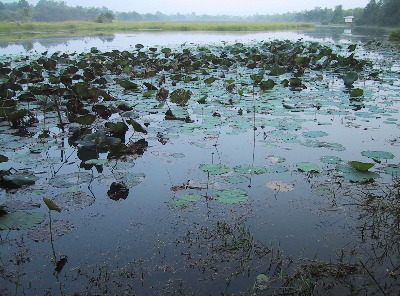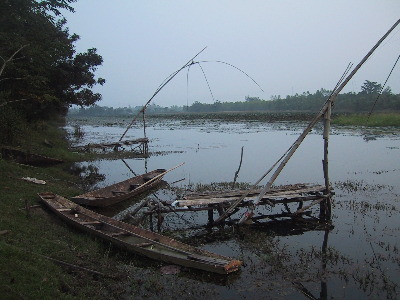
Look for the ghosts
This evening I went for my usual ride on the pedal bike for exercise but as Waree cannot comfortably ride the motorbike yet she did not escort me as she usually does. So I went around the Nong (lake) across the other side of the rice fields at the back of the house.
Up to now I have been forbidden to go there due to the ghosts. During my last visit we used to go to this Nong frequently and collect water snails or frogs for the evening meal. At times many children would be there collecting water lily flowers for the temple. During the wet season there would always be people fishing.
Since then 2 ladies drowned in the lake. Apparently they were in the water supporting themselves with empty plastic water containers used as floats when something went wrong. I know that Waree cannot swim and I suspect that most people here do not have that skill which is strange in that the whole landscape is peppered with lakes.
Anyway, now there are ghosts there and nobody will risk going to this nong anymore. Ghosts are completely real to people in the village and no amount of arguement would convince them otherwise.
I rode around the nong and I didnt see any ghosts but then being a Farang and an unbeliever I suppose that it is unlikely that I would have. I did see some fishing nets and one man netting fish at a drainage pipe coming out of the lake, so some people are still going there.

Boats
The most suprising thing was that before there was a big patch of water lilies in the centre of the lake and the rest was clear water. I should explain that the nong is rectangular about 300 metres across and nearly a kilometre long. Now the whole lake was a mass of water lilies. From talking to Waree I think that this is simply because people are no longer harvesting the lilies.
There are nongs everywhere and most of the villages appear to have been built on high ground dredged to make the lakes. The Government cuts these great trenches with excavators but I am not completely sure of the reason. It does create a store of water for the dry season and presumeably helps with flood control. It creates an additional source of food at the expense of land for rice fields, but then the economics of growing rice are so poor maybe nobody bothers about this.
No comments:
Post a Comment
Please leave comments which will help me improve my work